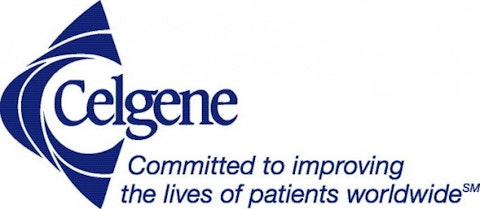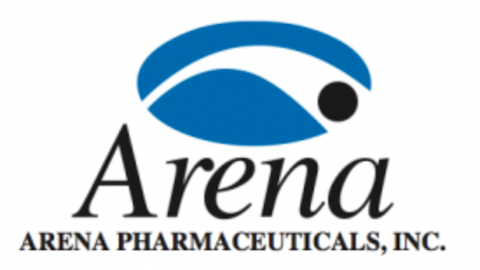Celgene Corporation (NASDAQ:CELG) was one of several companies presenting at the American Society of Clinical Oncology, or ASCO, annual meeting in Chicago this week. Here’s what the big biotech had to say.
Ho-hum for Abraxane
Findings from a phase 3 study of Abraxane in combination with gemcitabine in the treatment of advanced pancreatic cancer were presented on Sunday and Monday. The open-label study — known as the Metastatic Pancreatic Adenocarcinoma Clinical Trial, or MPACT — included 861 metastatic pancreatic cancer patients.
The first key result discussed related to the first 257 patients in the study to be independently evaluated using positron emission tomography, or PET, scans. 63% of the patients taking Abraxane with gemcitabine had a metabolic response compared to 38% of patients taking gemcitabine alone. The patients in the Abraxane group also had a median overall survival rate of 10.5 months versus 8.3 months for patients taking only gemcitabine.
Another major finding centered on levels of a key tumor marker called carbohydrate antigen 19-9, or CA19-9. Of patients taking Abraxane and gemcitabine, 61% achieved at least a 20% reduction in CA19-9 compared to 44% of patients who took gemcitabine alone. For the subset of patients who experienced this reduction in CA19-9, the survival rate of those taking Abraxane with gemcitabine was 13.2 months, significantly higher than the 9.4 months for patients taking only gemcitabine.
All of this was definitely good news, but it wasn’t surprising news. Celgene Corporation (NASDAQ:CELG) presented positive results from the MPACT study at another ASCO meeting in January.
Ho-hum for Pomalyst
Celgene Corporation (NASDAQ:CELG) received U.S. regulatory approval for Pomalyst in treating relapsed and refractory multiple myeloma on February 8. The findings presented this week at ASCO for Pomalyst, like those for Abraxane, didn’t catch anyone by surprise.
Updated data from the Pomalyst phase 3 study in treating multiple myeloma confirmed the strong findings initially presented in December. The most significant new information related to progression-free survival and overall survival rates. Celgene announced that patients taking Pomalyst with low-dose dexamethasone achieved a median progression-free survival rate of 4 months and a median overall survival rate of 12.7 months. This compared very favorably against the median progression-free survival rate of 1.9 months and median overall survival rate of 8.1 months attained by patients taking high-dose dexamethasone.
Hmmm for Revlimid
Not everything announced by Celgene Corporation (NASDAQ:CELG) was ho-hum, though. The company also presented results from a phase 3 study of a Revlimid combo in treating newly diagnosed multiple myeloma.
The surprise from this study was that patients taking Revlimid along with melphalan and prednisone had a much lower median progression-free survival rate of 24 months than the 38 months for patients on a high-dose chemotherapy and tandem autologous stem cell transplant regimen called MEL200. The five-year overall survival rate for patients on the Revlimid combo was also lower than those taking MEL200 — 62% versus 71%, respectively.
Celgene Corporation (NASDAQ:CELG) did have some good news from the study. Patients taking Revlimid as a maintenance therapy for either regimen showed higher median progression-free and overall survival rates.
Celgene shares have fallen by 3% or so this week, but that drop pales in comparison to the year-to-date gains of almost 50%. The disappointing Revlimid results won’t have a lasting impact on the stock’s performance.
Also, more studies including Revlimid in first-line treatment of multiple myeloma are likely on the way. In April, results from a phase 1/2 trial with Onyx Pharmaceuticals, Inc. (NASDAQ:ONXX)‘ Kyprolis in combination with Revlimid and low-dose dexamethasone showed promising results. Onyx Pharmaceuticals, Inc. (NASDAQ:ONXX) received Food and Drug Administration approval for Kyprolis as a third-line treatment for multiple myeloma in July 2012. Kyprolis is technically a rival to Celgene’s Pomalyst, but there’s room for both drugs to be successful.
Updates about Abraxane and Pomalyst this week probably caused a few yawns. Unfavorable results for Revlimid might have raised some eyebrows. However, I think Celgene Corporation (NASDAQ:CELG) continues to be a stock that will excite investors over the long run.
The article Celgene at ASCO: Ho-Hum, Ho-Hum, and Hmmm originally appeared on Fool.com.
Fool contributor Keith Speights has no position in any stocks mentioned. The Motley Fool recommends Celgene Corporation (NASDAQ:CELG).
Copyright © 1995 – 2013 The Motley Fool, LLC. All rights reserved. The Motley Fool has a disclosure policy.




